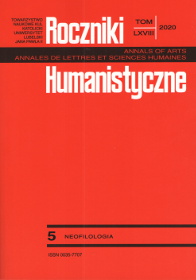Analysis of Expressions with Movement Verbs in Function of Lexical Economy and Redundancy: English-Spanish Contrastive Study
Abstract
This text constitutes a contrastive analysis of lexical economy and redundancy in verbal expressions. For this purpose, a bilateral study of the diacritical examples is carried out in two selected languages: English and Spanish. The analysis is based on a manual parallel corpus, which consists of verbal expressions collected in two versions of the same narrative literature text: A moveable feast / París era una fiesta by Ernest Hemingway. Our task is, above all, to compare the numerical data obtained after the census with the theories elaborated by the typological tradition. Taking into account the defining parameters of the phenomenon of economy, we establish its scale based on the empirical analysis of expressions with movement verb — one of the fundamental verb classes. These references lead us to the conclusion which language of the two listed above is more economic and which is more redundant in the lexical perspective.
References
Bembibre, Cecilia. “Definición de Redundancia.” Definición ABC, www.definicionabc.com/ comunicacion/redundancia.php /. Accessed 17 Feb. 2020.
Bień, Janusz. “Économie et redondance sémantique de l’expression verbale. Étude contrastive franco-polonaise.” Semantic Relations in Language and Culture, edited by Krzysztof Bogacki and Anna Miatluk, Wydawnictwo Uniwersytetu w Białymstoku, 2006, pp. 25-33.
Bień, Janusz. Le verbe pronominal à valeur neutre et passive dans les langues française, espagnole et polonaise. Werset, 2009.
Florczak, Jacek. “Economie sémasiologique et onomasiologique: tentative d’une analyse contrastive d’expressions verbales en français et en polonais.” Studia Romanica Posnaniensia, vol. 21, 1996, pp. 27-58.
Galan Rodriguez, Carmen. “Aproximación al estudio de los verbos de movimiento en alemán y en español: movimiento real y empleos figurados.” Anuario de estudios filológicos, vol. 16, 1993, pp. 147-158.
Gawełko, Marek. “Sur l’économie de l’expression linguistique romane.” Roczniki Humanistyczne, vol. 39-40, fasc. 5, 1991/92, pp. 67-81.
Gołębiowska, Katarzyna. “Economía y redundancia léxicas en las expresiones verbales. Estudio contrastivo en cuatro lenguas seleccionadas.” Studia Iberystyczne, pendiente de publicar.
Gołębiowska, Katarzyna. Economía y redundancia léxicas en las expresiones verbales. Estudio en algunas lenguas selectas. KUL, trabajo inedito, 2018.
Mendikoetexa, Amaya. ,,Construcciones inacusativas y pasivas.” Ignacio Bosque, and Violeta Demonte. Gramática desriptiva de la lengua española, vol. 2. Colección Nebrija y Bello. Espasa, 2000.
Real Academia Española. Diccionario de la lengua española. 2019. https://dle.rae.es/. Accessed 12 Jan. 2020.
Suadoni, Anna. Verbos de movimiento, dexis y proyección metafórica. El caso de andare y venire en contraste con ir y venir. Universidad de Granada, 2014.
Copyright (c) 2020 Roczniki Humanistyczne

This work is licensed under a Creative Commons Attribution-NonCommercial-NoDerivatives 4.0 International License.





